February 28, 2023
 by Quincy Smith / February 28, 2023
by Quincy Smith / February 28, 2023

In a perfect world, every piece of content would rank well.
Unfortunately, that's not the world in which we live. If you want your content to rank well, there are specific search engine optimization techniques you need to implement to ensure it has the best chance to climb up the search engine results page. SEO software is often used to identify areas for improvement in content that could help produce higher organic rankings on search engines such as Google, Yahoo, and Bing
In this article, we will explore organic search, why it’s essential for your business, and how to improve your search rankings to drive more traffic. To help illustrate all of this, we’re going to refer to a live page and dive into actionable tactics aimed at improving visibility within Google.
There’s a lot to explore when it comes to organic search, but first, what is it exactly?
Organic search results are unpaid listings on a search engine results page (SERP) that appear based on relevance to the user's search query, search engine optimization (SEO) efforts, number of backlinks, and domain authority. It drives users to your site naturally without spending money or using advertisements.
To capture this traffic, your website pages must be optimized around search topics to show up when people are looking for them.
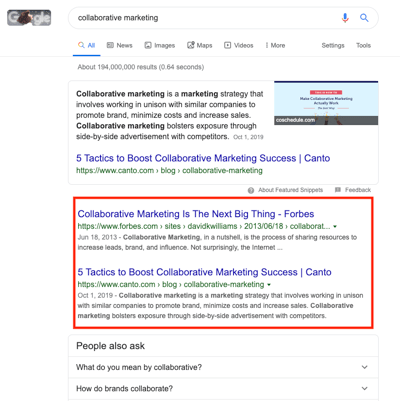
If you want to see how much organic search traffic you’re currently getting, head over to your Google Analytics Dashboard and click on Acquisition > All Traffic > Channels. Then, check out the data. If you expand the date range, you should get a good idea of your performance over time.
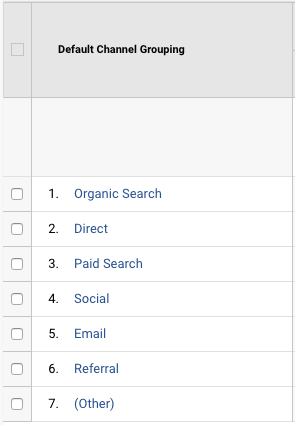
Tip: In addition to Google Analytics, there are many other digital analytics software solutions you can use. Check out our list of some of the other options out there!
Compared to other marketing channels, organic search is king. Not only is it owned (meaning you control every aspect), but it’s also free (meaning traffic doesn’t stop just because you stop paying).
From a business perspective, growing your organic footprint has a few significant advantages when it comes to how your company performs:
Remember how we said the organic search was pretty much free? Paid search is the opposite - your traffic will stop when you stop paying for ads.
In the context of Google search results, the difference looks like this:
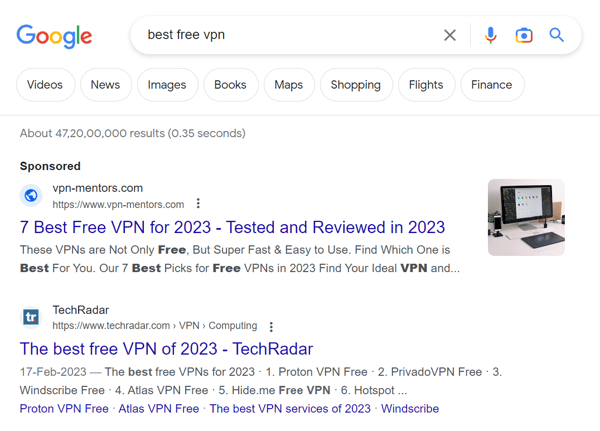
The first three results are paid (as denoted by the ‘Ad’ tag), meaning they will disappear once these companies stop paying. The fourth result is organic and should drive traffic for the foreseeable future.
Direct traffic is often confused with organic but is quite different in definition. Direct traffic usually occurs when a user types a URL into their search browser without searching for anything.
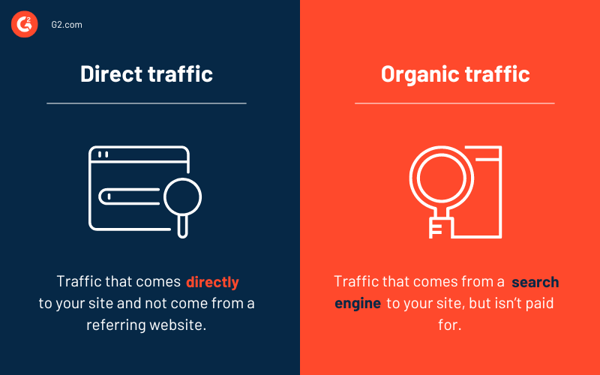
This is still incredibly valuable traffic as it demonstrates brand recognition, but it should not be confused with organic search (and is therefore broken out in the aforementioned Google Analytics report). You can consider direct traffic as a benefit of search traffic - the more times a user sees you in the search results, the more likely they are to head to your site directly in the future.
Now is a good time to explore how SEO works, and why some pages rank while others don’t. It’s in Google’s best interest to show the best search results for a given topic. This not only keeps searchers happy but also keeps them coming back to use the search engine.
To determine which page is the best, search engines use bots to scan or crawl the page to identify elements like keyword usage, image optimization, links, and multiple other factors. These factors determine how well-suited a page is to rank for a given term and is displayed (or not displayed) accordingly. There is no proven formula when it comes to getting your page to rank, but there are some best practices we’ll dive into in the next section.
By now, we’re assuming you’re fully up to speed with organic search and how it can help your business - time to look at some ways to move the needle on your traffic.
We will use a 2019 live post example from the Ampjar blog on collaborative marketing here.
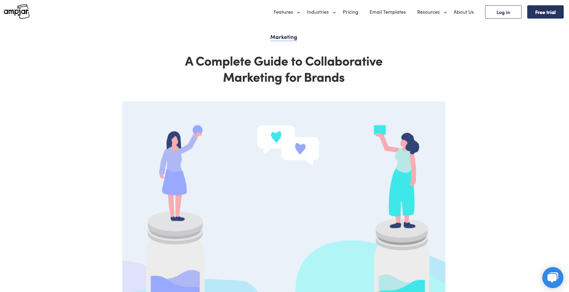
In terms of organic traffic, this page isn’t doing so hot - it was published in July and is still sitting on the top of page three for its focus term, “collaborative marketing”.

This is a valuable term for us for a few reasons, the biggest being that the Ampjar platform facilitates collaborative marketing, so the more relevant traffic we can drive to our site, the better.
The good news is that position 21 isn’t a bad place to be if you haven’t done much to boost rankings beyond on-page optimization. On top of that, the focus term here is pretty low competition, so even the slightest adjustments should make a positive impact.
With the exception of keyword research (which is a requisite when it comes to organic search), the following tactics are organized from least effort to most effort - let’s get started!
Knowing what to write about is crucial when it comes to driving organic traffic. If you neglect the research phase, you run the risk of wasting resources and not getting anything in return. A good topic exists where volume meets relevance - you want people to search for it, but it must also be relevant to your business.
Ubersuggest is a great free keyword research tool that will let you explore topics as much as you want; simply inputting a term lets you see estimated search volume, difficulty, related topic ideas, and other websites that are ranking for that term.

You can easily dig down by inputting each competing page into the keyword report tool and see what terms their page ranks for. Do this enough, and you should have a solid list of terms to cover in your post.
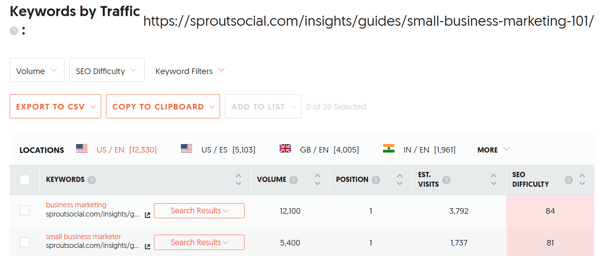
Once you have content or a website page, the easiest place to start is by examining what you have on the page already and finding places to better optimize for your search term(s). To make this easier, use a Chrome SEO extension called SEO Quake that breaks out the page’s on-page elements into an easy to scan format.
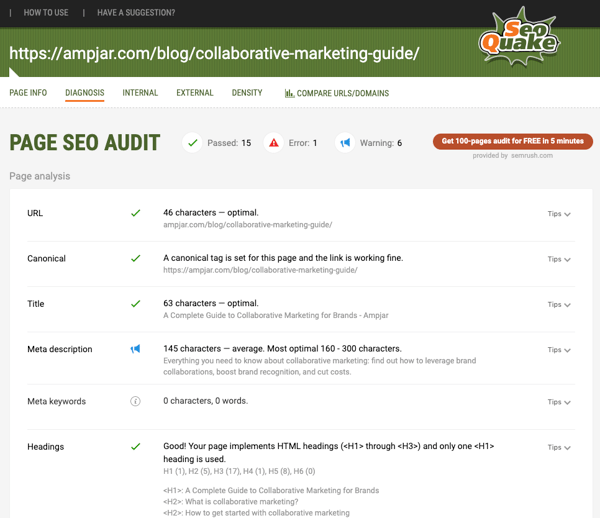
What we're looking for here are opportunities to optimize this page for the keyword better, and there seems to be one big opportunity related to images - 23 of them are all missing ALT tags.

ALT tags allow search engines to understand better what a picture is about (though Google is getting better at this every day), so we’d want to go in add in some tags while making sure to include our keyword when relevant.
In addition, I also want to make sure this page uses the search term in the main headers like the title, H1, H2s, and so on. Assuming these all check out, you can also use SEO Quake on competing pages to compare things like word count and keyword density to see if you’re coming up short anywhere.
Internal linking is the act of pointing links from your site to the page you’re trying to rank. Doing so not only helps search engines better crawl and understand your site but can increase authority and relevance to the receiving pages.
As part of our publishing process, we always make sure to point a few internal links at new blog posts, but there is always room for improvement, especially when it comes to anchor text. To start, I'm going to plug our page into Ahrefs and view the Internal Backlinks report:
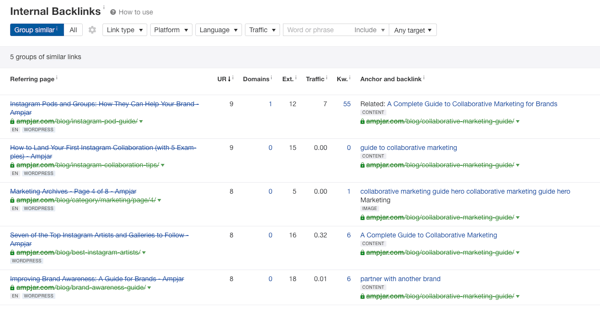
The report shows that I have five internal links pointed at this post, four of which use “collaborative marketing” in the anchor text. This looks good to me, and if I were to add anything here, then I’d add (or change) a link with an exact match anchor of our focus keyword.
Our next option is to make sure our content is written in a way that not only targets as many relevant keywords as possible but is also structured in a helpful format.
To do this, we will need both Ahrefs and Google Search Console, with the latter being our first stop. Search Console will show us exactly what terms we currently rank for, including clicks, impressions, CTR, and ranking.
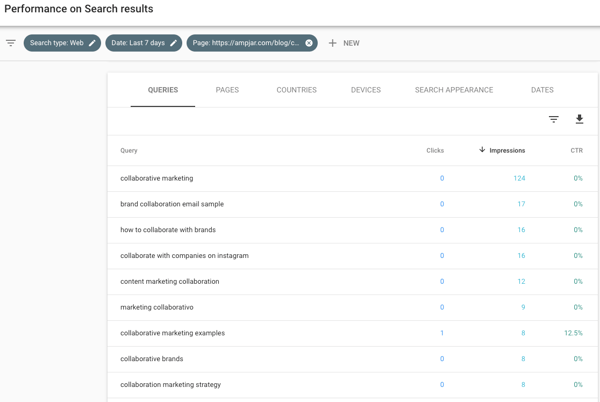
If we couple this with a report from Ahrefs showing what our competitors are ranking for, we’re going to have a nice list of terms we want to make sure are included in our post to cover the topic as thoroughly as possible.
One thing that stands out here is the term “collaborative marketing strategy”. We didn’t cover this in our guide, so it might be worth going back in and adding a section that focuses just on that term.
There is lots of good information out there related to search intent. However, while it should play a part in your planning, it’s only 50% effective if you neglect the clues Google gives you regarding what it wants to see.
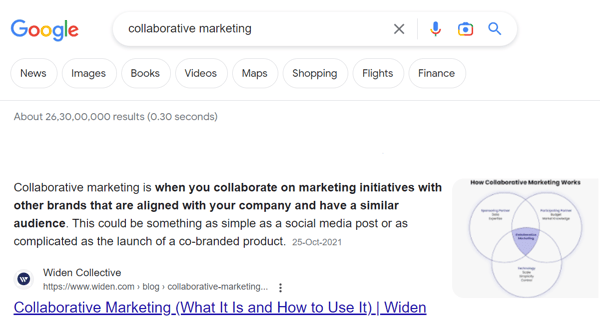
For example, if we look at the search engine result page for our keyword, we’ll see a featured snippet at the top - this is a special type of search result and is often easier to rank for than the true position 1. In our case, we’d want to investigate this and pay attention to how Canto structured their content to be featured here.
Additionally, this search query also returns map listings about halfway down the page:
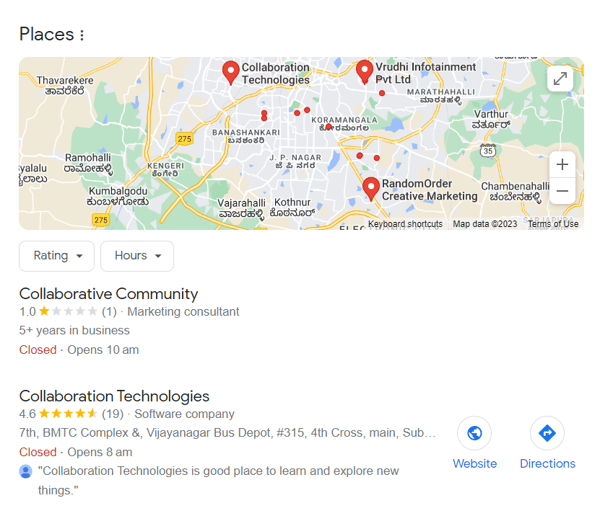
If we were a local business that offered collaborative marketing solutions, we’d want to make sure our local SEO was fully optimized, so we didn’t miss out on any clicks.
While the existence of different types of search queries can reduce the visibility of actual pages, it can also provide an opportunity for businesses not already on page one to better optimize around a search term.
Another example of this is images - while “collaborative marketing” isn’t the best topic for an image search, there is a lot of traffic to be won for images that show up in the image section of Google:
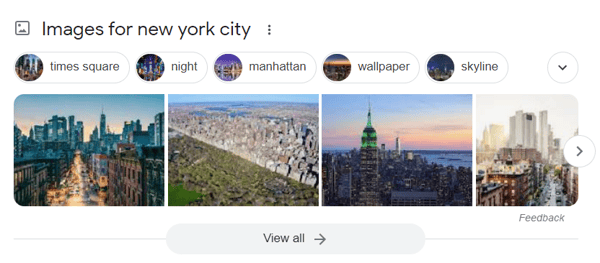
External link building is when you contact other websites to get them to link back to your page. While Google hasn’t confirmed that link quantity is a ranking factor, studies like this continue to confirm the importance of backlinks when it comes to organic search.
There are dozens of link building tactics out there, and instead of trying to summarize them all, we’re going to focus on one that could be a good fit for our post: resource page link building.
In this strategy, we want to find pages that list relevant marketing resources and see if they will include our guide as well. We can approach this in two ways:
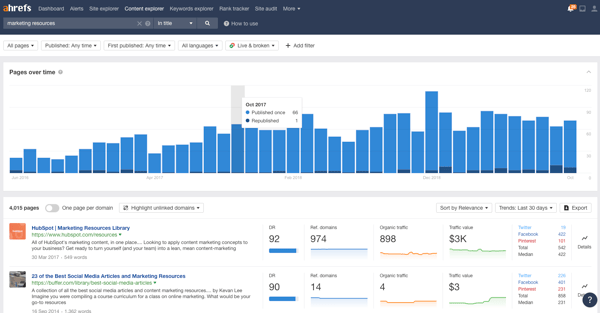
The first involves the Content Explorer tool in Ahrefs, where you can search for a topic and see other sites that have written about it. In this case, we’re looking for pages where “marketing resources” is in the title. From there, we’d want to export the list and vet each candidate before reaching out to them.
The next method is a bit more time-intensive but doesn’t require a paid tool - you’ll use a search operator like “allintitle:marketing resources,” which looks for page titles that include “marketing resources” or “allinurl:marketing resources” which does the same but with URLs.
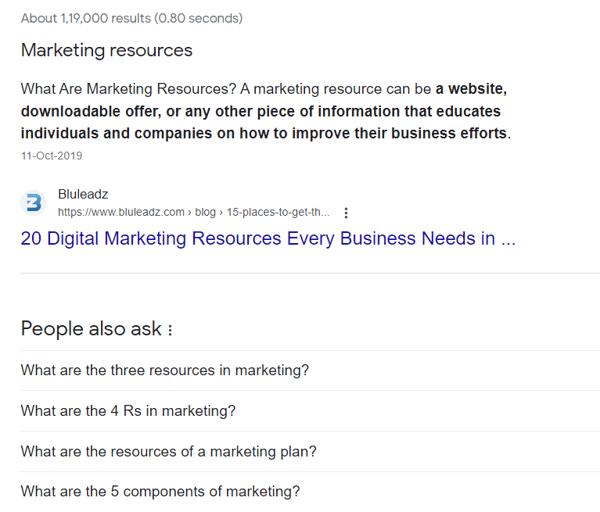
Once you have a nice list of candidates, you can find their emails using a tool like Hunter and craft a message asking them to include you on their page.
Using social media marketing is an excellent strategy for creating a community that's engaged with your brand. You can post your content on relevant, high-traffic platforms such as LinkedIn, Quora, Facebook, Twitter, Reddit, and Slack groups to boost traffic and build brand awareness.
But before you promote your content, building trust and cultivating a relationship with your audience is essential. You can do this by interacting with your followers on various social networks to make a sound, long-lasting rapport. That way, they're more likely to share your content. This is an integral part of this strategy, as your methods could otherwise look spammy.
Leveraging influencer marketing can also benefit your business, as influencers have dedicated followers who trust their recommendations. Finding social media creators who align with your brand's mission and values is essential to drive a successful marketing campaign. Partnering with them is one of the best ways for your brand to build a genuine relationship with your consumers.
It’s possible to get lost in the weeds trying to incorporate organic search tactics into your company. If you’re a small business with limited resources, you can make significant progress by only focusing on keyword research and on-page best practices. Once you get a bit of traction and a few dozen posts under your belt, then you can start going back and reviewing your posts for link, keyword, and query opportunities.
Finally, do not expect overnight success. SEO and organic search is a marathon, and building a foundational and systematic process should be your primary goal - done correctly, you can expect to see consistent, relevant traffic for years to come.
Discover the latest trends in SEO strategy and rank higher on search engine result pages.
This article was originally published in 2019. It has been updated with new information and examples.
Quincy oversees SEO & Content at Ampjar, a brand-to-brand email advertising platform. He’s passionate about IPAs, strong coffee, and solo travel.
Search offers a far richer experience than ever.
 by Stephen Jeske
by Stephen Jeske
If you're struggling to rank pages, despite your best keyword optimization efforts, it's time...
 by Stephen Jeske
by Stephen Jeske
As if having a sound social circle to interact with wasn’t enough, humans have begun talking...
 by Kevin Reis
by Kevin Reis
Search offers a far richer experience than ever.
 by Stephen Jeske
by Stephen Jeske
If you're struggling to rank pages, despite your best keyword optimization efforts, it's time...
 by Stephen Jeske
by Stephen Jeske


